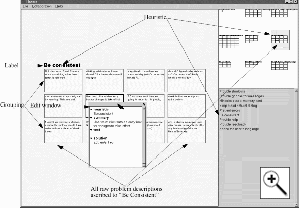Extending Heuristic Evaluation
through results synthesis
Results synthesis refines the process of Heuristic evaluation, which is itself a discount usability engineering technique. We define results synthesis as a process of creating a complete, coherent, and concise statement of the problems in an interface and their possible solutions from a collection of raw problem descriptions generated by a Heuristic Evaluation inspection. We also define results synthesis as a participatory practice in environments supporting emergence. These requirements are used as the basis for designing a real-time distributed groupware system to support results synthesis. The system is refined and found to be usable in an iterative formative evaluation.
The figure illustrates the PReSS groupware system supporting results synthesis. This initial snapshot shows a group's view of their raw problem as they first appear in PReSS. The main pane (left) shows a portion of the workspace: we see problem (written on cards) categorized by the heuristic "Be Consistent". The upper right pane contains a radar overview showing all problems, while the bottom right pane lists all problem category headers. By following results synthesis, the group will restructure and reorganize the problem cards through emergence. PReSS supports emergence through spatial hypertext; cards to be moved about and collapsed together, new headings created, and final "problem reports' written. The different panes are linked together: cards can be manipulated directly in both overview and radar view, or can be dropped onto category headers. Similarly, all views afford rapid navigation from one part of the workspace to another.
Primary Investigators
Donald Cox (as part of his MSc Thesis)
Saul Greenberg (Supervisor)
Milestones
- PReSS groupware system supporting results synthesis implemented and evaluated.
- Several short papers and an MSc Thesis were produced.
Current Status
- The project is complete, although some papers still have to be written.


 ucalgary.ca
ucalgary.ca
